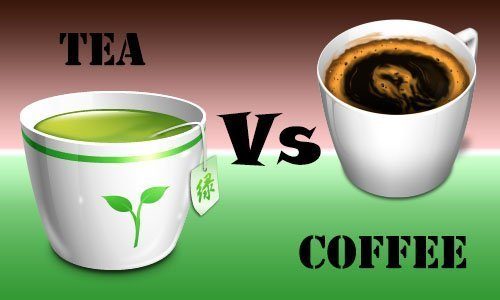Introducing Tea |
Introducing Coffee |
| Origins – Around 10th Century BC or 1000 BC in China
Main Production Areas – China, India, South East Asia Popularity – After water tea is the most consumed beverage in the world. Caffeine Content – 30 – 90 mg in 250ml |
Origins – Around 15th Century AD or 1500 AD in Ethiopia
Main Production Areas – Mid Africa, South America, South East Asia Popularity – One of the most consumed beverages Caffeine Content – Brewed 100 – 160 mg in 250ml |
Pros – positives for tea |
Pros – positives for coffee |
| a) Packed with anti-oxidants. b) Reduces the risk of cancer through presence of poly-phenols. c) Rich in vitamins C, D and K and amino acids. All of which are required for good bodily functioning. d) Has a relaxing, soothing effect on the human body, which is good for relieving unhealthy stress. e) Contains compounds which strengthen the teeth |
a) Great energy-booster and stimulant. b) Helps prevent liver disease. c) Decreases the chances of kidney stones in both men and women. d) Majority of recent research suggests that moderate coffee consumption (2 or 3 cups) may be mildly beneficial in healthy adults. |
Cons – Negatives for Tea |
Cons – Negatives for Coffee |
| a) High fluoride content increases risk of osteoporosis and fractures. b) Over-consumption of oxalates increases risk of kidney stones. c) If tea is consumed in large amounts, it increases risk of liver damage. |
a) May cause loss of appetite. b) Some Research links caffeine consumption with increased risk of miscarriage. c) May cause loss of appetite. d) Stains teeth over the years. e) May cause sterility in men and increase risk of heart disease f) May lead to constipation and indigestion. The majority of recent research suggest that moderate coffee consumption is mildly beneficial in healthy adults. Coffee can however worsen the symptoms of some conditions, largely due to the caffeine and diterpenes it contains. New research links caffeine consumption with possible increased risk of miscarriage. So if you’re pregnant, stick to decaf beverages and talk to your doctor about caffeine. |
Your best bet |
|
| Green tea is the best way to consume tea as it promotes fat loss, is filled with antioxidants, and is the least processed of all the varieties. Tea bags are also better than loose leaves, as we can easily overcook leaves and lose its good effects. | De-caffeinated is the way to go if you must consume coffee. Since it eliminates the caffeine content, it simultaneously eliminates the problems that accompanies it as well, making it the healthier option. |
Word Reference
Antioxidants – are phytochemicals, chemicals found in plant foods. In our bodies, antioxidants protect healthy tissues from “oxidants,” also called free radicals. Over time, free radicals can damage cells and cause disease.
Oxalate – is the dianion with the formula C 2O2- 4, also written (COO)2-
Caffeine – Caffeine is a bitter, white crystalline xanthine alkaloid and a stimulant drug.

